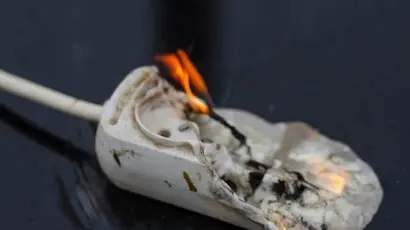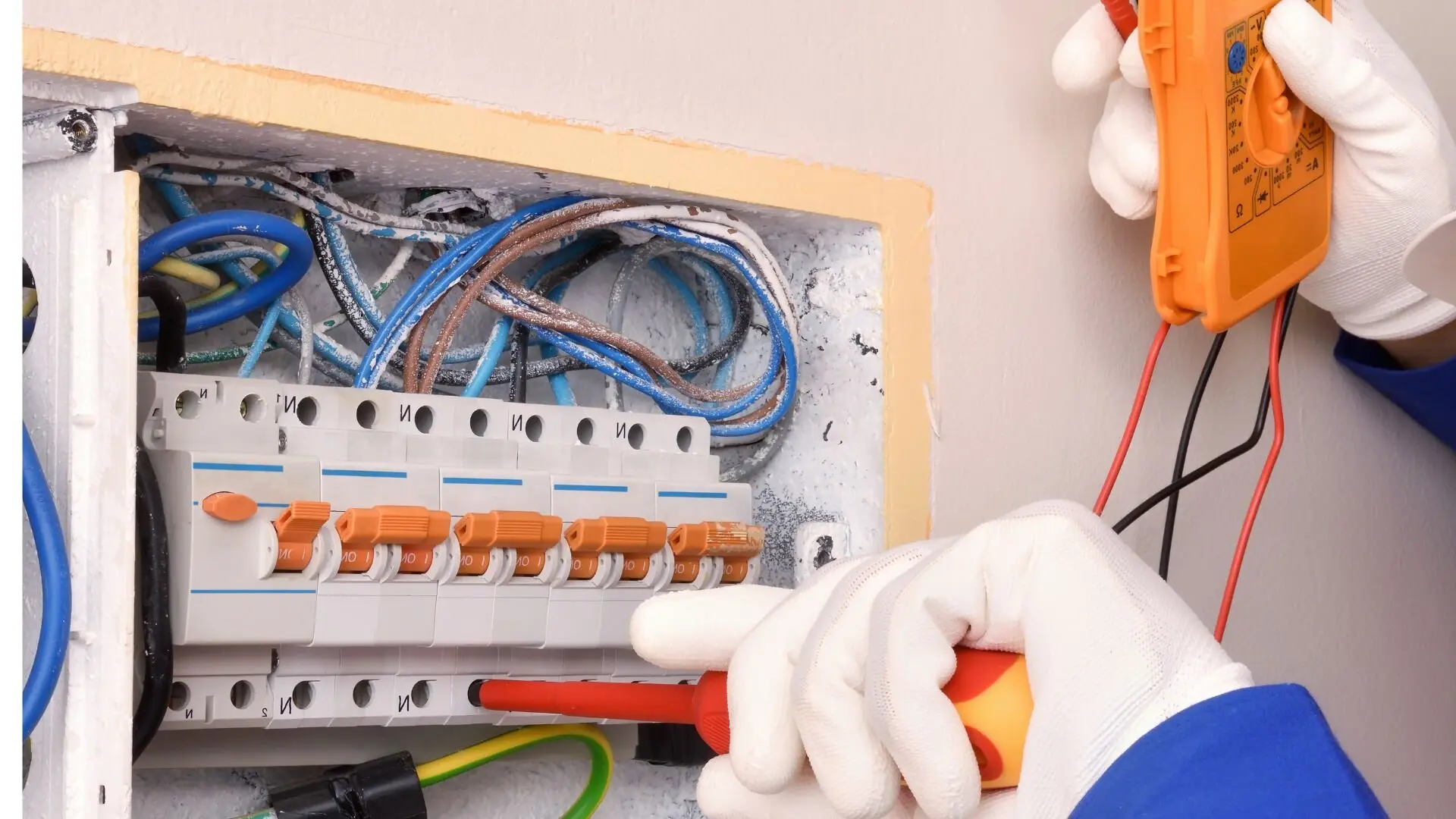
Get your free Melbourne Electrician quote today!
Our team of Melbourne Electricians is here to help you with any questions or concerns you may have. We’re committed to providing you with the best possible service and support.
Uncover effective strategies for preventing electrical fires with routine inspections and safety precautions. Protect your home by following these essential safety tips and strategies.
Electrical fires can quietly wreak havoc in Australian homes. It’s important to understand the hidden dangers and how regular inspections play a key role in keeping your property safe.
Did you know that electrical fires account for 6% of residential blazes in Australia? Each year, these incidents claim 40 lives and injure 1,000 people on average. This highlights the critical importance of electrical safety in your home.
Electrical fires are uniquely dangerous. They often smoke undetected within walls or ceilings for hours before erupting into visible flames. Your home’s electrical system can harbour unseen hazards, from outdated wiring to overloaded circuits. The insidious nature of an electrical fire makes it particularly dangerous, as it can spread rapidly before you become aware of the threat.
Crucial to keeping your home safe is paying close attention to your electrical setup. Regular check-ups of your home’s electrical system can fight against hidden dangers. By catching problems early, these inspections help prevent electrical fires, lowering risks and protecting your family and home.
Prioritising electrical safety through consistently monitoring your electrical system is essential for protecting your home and loved ones from the silent threat of electrical fires
What Are The Electrical Fire Risks?
Electrical fire risks are present in many Aussie homes, often going unnoticed until it’s too late. Understanding these dangers is crucial for homeowners to safeguard their properties and families.

Importance of Prompt Action
When these signs appear, immediate action is vital. Ignoring them can lead to devastating consequences. Regular maintenance by a licensed electrician can prevent many issues before they cause fires. DIY electrical work is risky; always consult professionals for repairs.
Essential electrical safety tips include avoiding overloaded circuits, replacing worn extension cords, and installing smoke alarms. Remember that electrical outlets experiencing wear and tear can cause fires. Protecting your home or business starts with vigilance and quick responses to potential hazards.
Advanced Inspection Techniques Used by Professionals
Professional electricians employ sophisticated methods to ensure thorough electrical safety inspections. These advanced techniques provide comprehensive insights into your home’s electrical system.
Thermal Imaging Cameras
Electricians use thermal imaging cameras to detect overheating in electrical components. This technology can identify invisible fire hazards, such as overloaded circuits or faulty connections.
Voltage Detectors
Specialised voltage detectors allow professionals to check for live wires and ensure proper insulation safely. This tool is crucial for preventing electrical shocks and fires.
Specialised Testing Equipment
Advanced multimeters and circuit analysers help electricians assess the overall health of your electrical system. These devices can identify issues like voltage drops or current leakages that might go unnoticed.
Benefits of Professional Inspections over DIY Checks
While DIY electrical work might seem tempting, professional inspections offer significant advantages. Licensed electricians have the expertise and equipment to conduct thorough assessments. They can identify complex issues homeowners might miss, ensuring comprehensive safety checks. Professional inspections also comply with Australian standards, providing peace of mind and potentially avoiding legal complications.
Ensuring Compliance with Electrical Safety Regulations
Compliance with electrical safety regulations is crucial for protecting your home business and ensuring peace of mind. Australian electrical standards, such asAS/NZS 3000, provide comprehensive guidelines for electrical work. These regulations cover everything from wiring to the installation of fire extinguishers. Non-compliance can lead to severe consequences, including fines, insurance claim rejections, and increased fire risks.
Experienced electricians are essential in meeting these standards with regular inspections. Their expertise ensures everything’s up to code, cutting down the chance of accidents like overheating and fires. Hiring licensed professionals to guarantee your electrical systems meet regulations is crucial for staying safe and sidestepping legal problems.
Extending the Lifespan of Electrical Systems
Proper maintenance is critical to maximising the longevity and efficiency of your home’s electrical systems.
Regular maintenance significantly prolongs the life of electrical systems. Professional inspections identify wear and tear before significant issues develop, ensuring components function optimally for extended periods. This cost-effective preventive approach reduces the need for expensive emergency repairs or complete system overhauls.
Addressing minor issues promptly prevents them from escalating into major problems, saving time and money in the long run. Quick responses to electrical concerns also minimise safety risks, protecting your property and its occupants. Investing in routine check-ups and timely repairs leads to a more reliable and durable electrical system.
Preparing for an Electrical Inspection
Before the inspection, all electrical panels, outlets, and appliances should be clearly accessible. Compile any previous inspection reports or recent electrical work documentation. The inspector will examine your property’s electrical system, including wiring, circuit breakers, and safety devices. They’ll check for code compliance, wear and tear, and potential hazards.
Depending on the property’s size and complexity, the process typically takes a few hours. Post-inspection, you’ll receive a detailed report outlining findings, safety concerns, and recommended actions. This documentation is valuable for addressing issues and maintaining records for future reference or property transactions.
Choosing a Licensed Electrician for Inspections
Hiring qualified professionals is essential for thorough and reliable electrical inspections.
Look for electricians licensed by the relevant state authority who hold current insurance. Depending on your needs, seek professionals with specific experience in residential or commercial inspections.
Verify credentials through official channels and check for memberships in professional associations. Research their reputation through customer reviews and ask for references. Consider electricians who offer detailed reports and clear explanations of findings. Feel free to ask about their inspection process and the equipment they use—Prioritise professionals who emphasise safety and adhere to the latest Australian electrical standards.
Fire Prevention Tips for Property Owners
Conduct regular visual checks of electrical outlets, cords, and appliances for signs of wear or damage. Replace frayed cords and damaged plugs immediately. Use power outlets correctly, avoiding overloading or daisy-chaining power boards. Limit one high-wattage appliance per circuit to prevent overloading.
Maintain appliances according to manufacturer instructions and unplug them when not in use. Keep electrical devices away from water sources and flammable materials. Install safety switches and smoke alarms throughout your property and test them regularly.
Don’t run cords under carpets or furniture; they can overheat. Always match the right wattage to your lights and lamps. Make sure you book professional electrical inspections every year to spot any potential issues early.
Educate all occupants about electrical safety practices and create an emergency plan in case of fire. Prevention is critical to protecting your property and its inhabitants from electrical fires.
Safety Devices: An Extra Layer of Protection
Arc-fault circuit interrupters (AFCIs) detect electrical arcing, a common cause of fires, and quickly shut off power to prevent ignition.
Ground-fault circuit interrupters (GFCIs) protect against electric shock by cutting power when they detect current leakage. These devices are essential in areas with water exposure, like kitchens and bathrooms.
Smoke detectors and fire alarms are vital for early fire detection, providing crucial warning time for evacuation. Interconnected alarms offer property-wide alerts.
Regular testing and maintenance of these devices ensure they function correctly when needed. Installing and maintaining these safety devices significantly enhances your property’s electrical fire protection, complementing routine inspections and safe practices.
Emergency Preparedness and Response
Develop and regularly practice a fire escape plan with all occupants. Identify multiple exit routes and establish a safe meeting point outside. Ensure everyone knows how to use fire extinguishers correctly, remembering the PASS technique: Pull, Aim, Squeeze, Sweep. Keep extinguishers easily accessible and regularly checked.
Know when to evacuate immediately - if the fire spreads quickly or smoke fills the area. Don’t attempt to fight large fires; prioritise evacuation. Call emergency services when you’re safely outside. Never re-enter a burning building. Conduct regular drills to ensure everyone is familiar with the emergency procedures.
Safeguarding Your Property, Protecting Lives
Routine electrical inspections are crucial for safeguarding your property and protecting lives. These checks identify potential hazards before they escalate into dangerous situations. Professional services are vital in ensuring comprehensive safety assessments and compliance with Australian standards.
WP Plumbing offersexpert electrical inspection services for both residential and commercial properties. Our team utilises advanced techniques and equipment to provide thorough safety evaluations. We’re committed to delivering top-quality inspections and prioritising customer satisfaction.
Don’t compromise on electrical safety. Regular inspections can prevent fires, save lives, and protect your investment. Take action today to secure your property’s electrical system.Contact WP Electrical for professional Testing and Safety Inspections. Our experienced team is ready to help you maintain a safe and compliant electrical environment. Call us now to schedule your comprehensive electrical safety assessment.
Published by: Pascal Harb17 October 2025